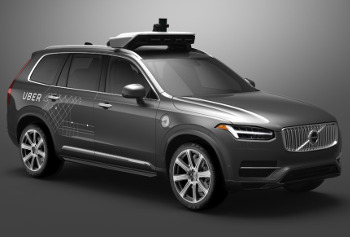 |
| August 23, 2016 | Volume 12 Issue 32 |
Designfax weekly eMagazine
Archives
Partners
Manufacturing Center
Product Spotlight
Modern Applications News
Metalworking Ideas For
Today's Job Shops
Tooling and Production
Strategies for large
metalworking plants
Uber is unleashing self-driving cars on Pittsburgh. What do you think?
Do you think driverless cars are safe -- or even necessary? Take the Designfax survey. We'd love to hear what you think.

Volvo and Uber are joining forces to develop next-gen autonomous driving cars. [Image: Volvo Cars]
An August 18 Bloomberg article titled "Uber's first self-driving fleet arrives in Pittsburgh this month" announced a new program that is putting self-driving Volvos in the ride-sharing business in Steel City.
The Volvo-Uber project marks the next big step in the auto business with a car manufacturer joining forces with Silicon Valley to drive innovation. The alliance is the beginning of what both companies view as a "longer term industrial partnership." Volvo Cars and Uber are contributing a combined $300 million to the project.
Travis Kalanick, Uber's chief executive, said in a recent Volvo company statement about the alliance, "Over one million people die in car accidents every year. These are tragedies that self-driving technology can help solve."
But is that really the big-picture end-game?
What is?
Better auto tech in general? Replacing all Uber drivers with automation? Increased fleet sales? Driverless cars for everyone? More cars? Less cars? What about the push to save energy -- where did that go? And what happens when the network goes down?
The Pittsburgh project, which also involves researchers from Carnegie Mellon University, will put a real human in the co-pilot seat of each of Uber's modified Volvo XC90 sport-utility vehicles. Whew!
The initiative is an extension of Volvo's Drive Me project, launched in 2013, that has put several semi-autonomous test vehicles on the road in and around Gothenburg, Sweden, since 2014. That endeavor is aiming to put fully autonomous vehicles in the city starting in 2017.
Both Uber and Volvo will use the same base vehicle for the next stage of their own autonomous car strategies. This will involve Uber adding its own self-developed autonomous driving systems to the Volvo base vehicle. Volvo will use the same base vehicle for the next stage of its own autonomous car strategy, which will involve fully autonomous driving.
Is this the future -- or just a trial run, an experiment that will eventually give way to something else?
Please take our short survey below. We'd love to know what you think. Please scroll down through the questions -- there are only four -- and then hit the blue "submit" button after the last one. We'll publish the results in an upcoming issue of Designfax. Thanks!
Some responses we've gotten so far to the last question of this survey -- overall push to develop self-driving technology:
* I am all about Hi-Tech, but there are too many things that can and will create a problem. GPS provides the road map, what happens when GPS is interfered with? The Chinese, Russians, ISIS, who knows what can mess with the GPS sending driverless cars off cliffs, off bridge, into traffic, into trees, buildings.
* I like it
* If it gets distracted people out from behind the wheel, it will be good.
* Too big of a risk to pedestrians and cyclists. All equipment eventually fails. To easily sabotaged.
* Greedy and dangerous.
* Such energy would be better used solving REAL problems, such as (insert your favorite REAL problem here).
* Sounds like a solution looking for a problem to me. Regarding safety: Eventually it might be safer but I believe that's a long ways off. Also how will these things handle all and varying road conditions such as? Weather conditions? Fog? White outs? Ice? Dust? Pot holes? Construction zones etc? Damaged, flooded or other wise missing road ways?
* Greedy people tring to sell us stuff we didn't ask for, don't want or need.
It is good but will need a lot of work to successfully interact with human behavior outside of the vehicle.
* Ludicrous. Electronic systems are too easily hacked. I don't want to ride in one, nor do I want to be on the same highways with others.
* It can not any worse that some of the drivers that on the roads now.
* It is generally a disaster and will make getting around much more frustrating and slow to accommodate a very small percentage of non or bad drivers. Like has been stated everywhere a solution desperately searching for a problem.
* I am looking forward to it.
* 100% Misguided (exception: military drone semi-autonomy). The "self-driving civilian automobile" engineering solution is exceedingly complex and fraught with environment-driven sensory processing and control feedback variables. The legal requirements to drive motor vehicles make the driver accountable for any accidents, a responsibility self-driving auto makers MUST assume for insurance purposes. I can't see them doing that without trying to worm that liability insurance premium into the vehicle price tag. I won't buy it on that basis alone. Labor-wise, self-driving vehicles would put many career drivers from truckers to taxis (including Uber) out of business. As someone who's driven easily 1M miles, automation creep into vehicle controls is something that unnerves me as a driver when the machine controls (e.g., cruise, anti-lock brakes) simply don't respond as fast as I need them to in traffic/weather conditions because they can't overcome their presets without decisive driver action.
Published August 2016
Rate this article
View our terms of use and privacy policy
